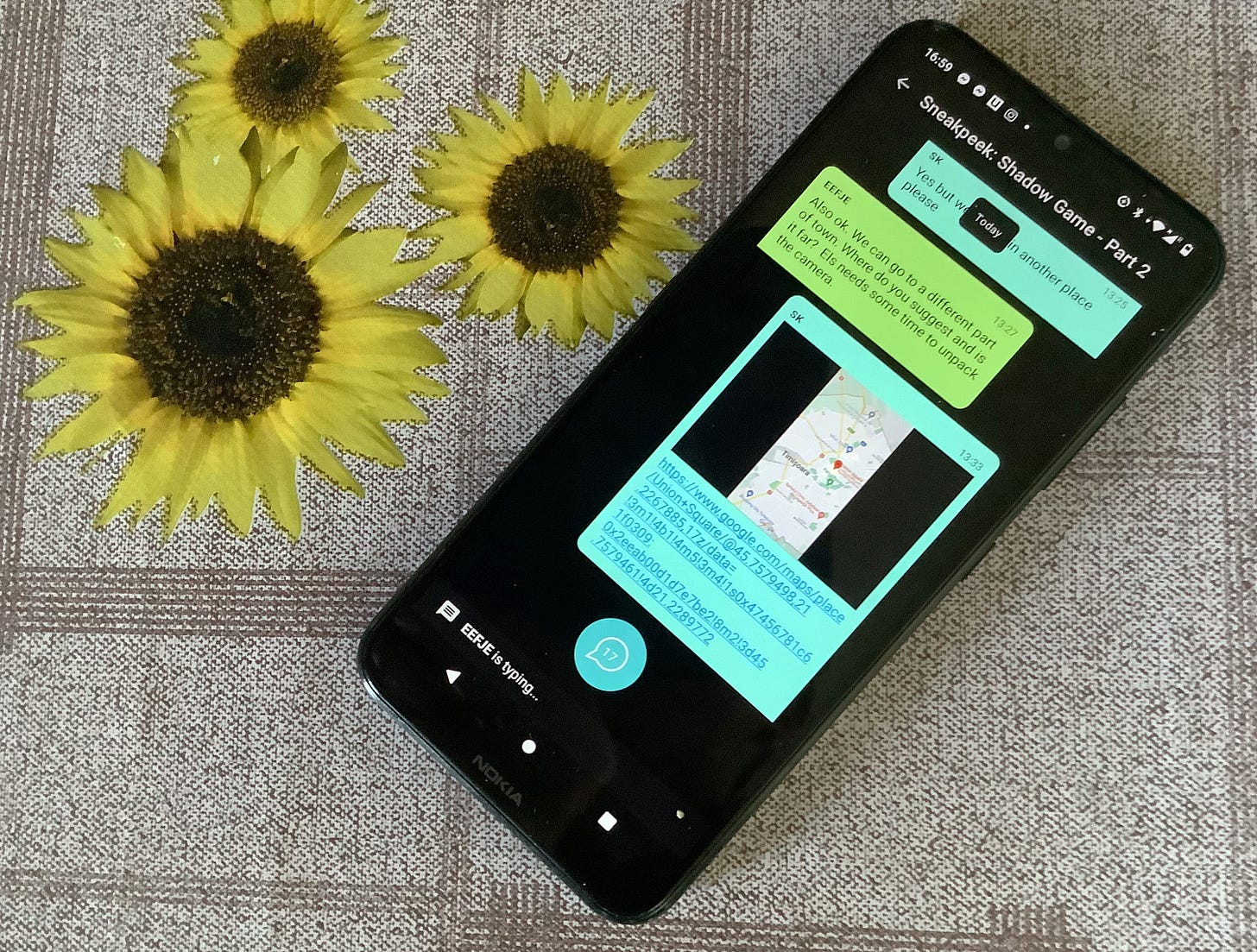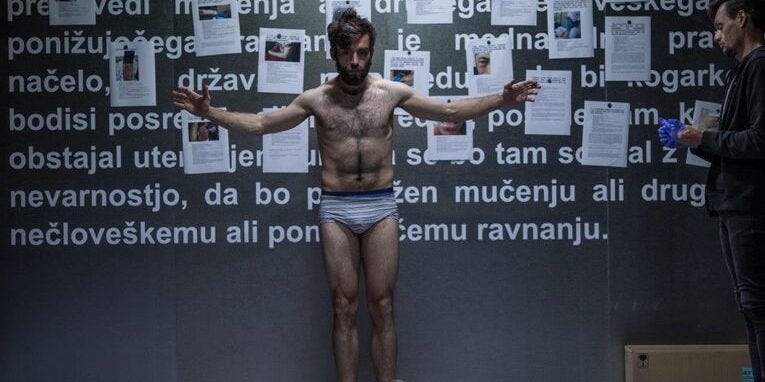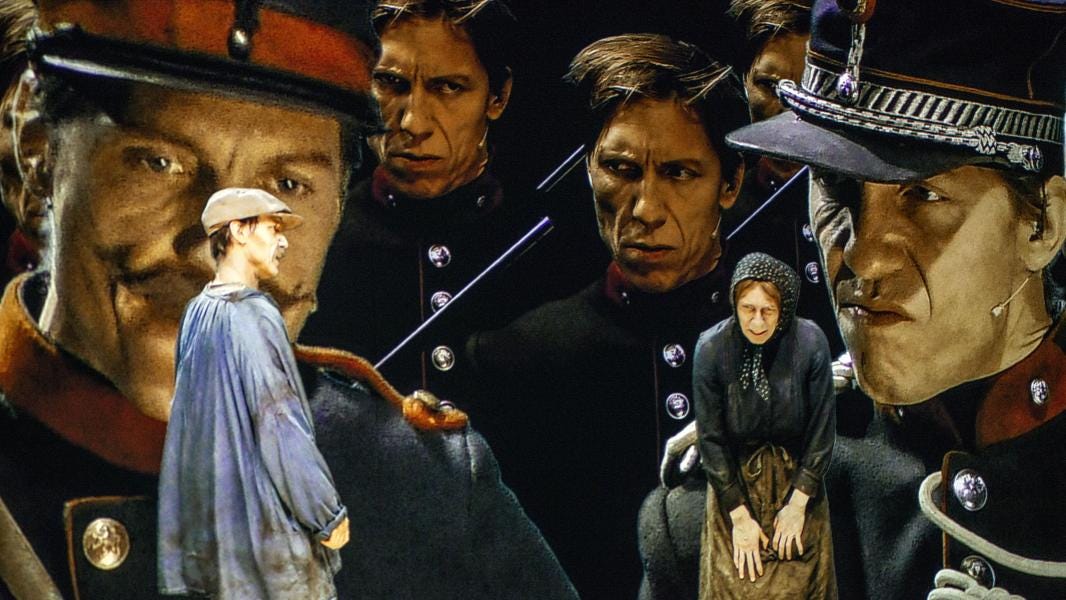Border stories: Sneakpeek Shadow Game
A look at SkaGeN's "real-time digital documentary" about the plight of young migrants crossing Europe and an interesting twist on the one-man show.
Welcome to Café Europa, a new weekly newsletter dedicated to European theatre. You can expect a mix of in-depth reviews and profiles of the artists and companies that excite me, plus festival coverage and other stuff.
I was excited to pass the 100-subscriber mark last week. Once again, thank you to my paid subscribers, it really makes a difference and will allow me to expand my coverage. I want to keep the content free, so all donations are very welcome. Or, if you want to, you can buy me a coffee via my Ko-fi account. If you find this newsletter valuable and think others would too, please do spread the word!
Shadow Game is a multi-media project by Dutch film makers Els van Driel and Eefje Blankevoort, the central pillar of which is a documentary charting the paths of a group of teenage refugees dealing first-hand with the consequences of Europe’s increasingly restrictive asylum policy.
The film was shot over a period of three years, and during this time the filmmakers met Afghan teenager Sajid Khan, with whom they stayed in touch. Later, in collaboration with SkaGeN – the innovative Antwerp-based theatre company consisting of SKaGeN of Valentijn Dhaenens, Korneel Hamers, Mathijs Scheepers and Clara van den Broek - they created Sneakpeek Shadow Game, an app-based extension of their documentary project.
Drawing on the thousands of chat messages, videos and audio files that Blankevoort, Van Driel and Khan (referred to as SK) sent to each other between 2019 and 2022, they have created what they call a “real-time digital documentary” which vividly captures SK’s experiences as he tries to cross Europe via the Balkan migrant route, facing repeated pushback at the borders.
Sneakpeek Shadow Game is divided into two parts. The first part concerns SK’s various attempts to cross the border into Croatia, having been stuck in Bosnia for over a year during the Covid pandemic. The second part concerns his experiences in Romania.
Border pushback is a depressingly common occurrence in Europe. It is standard practice for many border police forces. Refugees and migrants are forced back into the country from which they came without going them the opportunity to apply for asylum. Their belongings and documents are often taken from them. They are sometimes stripped and humiliated, intimidated and beaten. They are forced to sign paperwork without a translator present. Their status as minors is rarely taken into account.
The process of trying to evade police pushback has come to be known as the game. SK describes his various attempts to cross the border as either a ‘pedestrian game’ or ‘truck game’ depending whether he is trying to cross on foot or by vehicle.
Sneakpeek Shadow Game is experienced via a specially-designed app on which you are able to watch the exchange of messages between SK and Eefje (and, later, Els) over a period of days, as if it were a WhatsApp chat. SK sends video updates of himself and his fellow refugees in the notorious refugee camp near Bihac in Bosnia or camped out in the forest. Eefje helps whenever she can by suppling phone credit, location info or simply by cheering him up. Each attempt to cross the border is thwarted. He and his friends are dispatched back to Bosnia. Once he and his friends are hit with sticks. Another time, he is forced to wade through a river, wrecking his feet. The voice notes and photos remind you he is a teenager, young, vulnerable and alone in the world,
In the second part of SK decides that the Croatian route is impossible, so he travels to Timisoara in Romania, via Belgrade, to try a different route. Here he finds himself forced to hide out in filthy derelict buildings, freezing at night. His phone breaks so he needs to buy a new one, depleting his funds further. Eefje and Els occasionally rent him an apartment so he can sleep somewhere safe and warm for a night or two, but they are legally limited as to what they can do.
I experienced – I think this is the best term – the first part of Sneakpeek Shadow Game during this year’s Edinburgh Fringe, where it was presented as part of the Big in Belgium programme alongside SkaGeN’s other show, The Van Paemel Family. If I’m honest, I’m not sure this was entirely the right environment to engage with the material. Seeing multiple shows each day and racing around between venues meant I usually ended up looking a day’s worth of messages in the small hours of the night. However, with the second part I followed the story more closely and it was a much more gripping experience as a result. I found myself excitedly waiting for updates from SK, and, during one particularly tense episode where SK has limited time to catch a train, I found myself avidly watching for the three little dots that indicated a new message was being typed, almost physically willing him to get on the train.
Does this qualify as theatre? Maybe not technically. As mentioned, the term they use is ‘real-time digital documentary.’ But it certainly worked as drama. The makers have talked about SK’s journey in relation to The Odyssey and there’s a definite epic quality to it. The way in which the messages are spread out – sometimes in quick flurries, sometimes with long, anxious gaps between replies - also gives it the immediacy of something being experienced in real-time. When the messages abruptly stop, it’s as tense as any cliff-hanger.
While a lot of people in theatre talked about digital innovation and access at the height of the pandemic, once restrictions were lifted a lot of this work dried up. It’s exciting to see a company embracing the storytelling potential of our phones. SkaGeN have alighted on a format that really captures SK’s predicament. While the communications have been edited and condensed, with months reduced to weeks, it still effectively conveys what SK is up against. He is treated like a human ping-pong ball, a threat and a pest, someone less than human, and forced to take increasing risks in order to find a place of safety where he can build a life.
At times I found myself comparing it to The Game, a piece of documentary theatre directed by Žiga Divjak (for more on his work, see last week’s edition) for Slovenia’s Mladinsko Theatre. The Game is based on testimony from the Border Violence Monitoring Network database and uses verbatim techniques and repetition to drum home the brutality of pushback tactics and to illustrate how cruelty has become a systemic part of the way Europe polices its borders.
While The Game presented the bigger picture, with grim statistics about the number of people who have died attempting the ‘game,’ the Sneakpeek format zooms in one young man and is more personal and intimate as a result. You hear SK’s voice and see his face. His story seeps into your everyday routine. You become wholly invested in his plight, as he gears himself up to make yet another crossing, hoping that this time he’ll make it.
It’s worth noting that the company is now working on a third part of the project, designed to be performed on stage. Entitled Gambling Game, it will premiere in Marc 2024 – so it’s possible to consider the two parts of Sneakpeek Shadow Game as a digital prologue to a live performance.
The Van Paemel Family: going solo
The second show presented by SKaGeN at this year’s Edinburgh fringe was more conventional, in so much as it was presented in a theatre space, at Zoo Southside, the home of the Big in Belgium programme. But it was still one of the most technically accomplished shows I saw this year.
Like many fringe-goers I first encountered SKaGeN’s work in 2012 when I saw BigmoutH, Valentijn Dhaenens’ virtuoso one-man show encompassing 2,500 years of oratory. The company would return in subsequent years with SmallWaR and Unsung.
The Van Paemel Family, based on a 1903 play by Flemish writer Cyriel Buysse, also stars Dhaenens. He plays every single character in the play using techniques previously developed along with designer Jeroen Wuits for SmallWaR, which allow him to interact with numerous digital versions of himself.
Set at the dawn of the 20th century, Buysse’s play depicts the trials faced by a family of Flemish farmers as they work the land of the local baron. While the father and mother are accustomed to a lifetime of toil, some of the younger generation reject the idea that this is the way things have to be and seek a new life in America.
Dhaenens plays all the characters, the unfortunate daughter impregnated by the baron’s son, her invalid brother, a haughty noblewoman, the local priest, the stoic mother and the father aggressively resistant to change. The majority of the characters appear on a large screen behind him, which is shaped like a small house with a sloping roof. The surtitles are projected on this screen too. Each character is beautifully lit, like a painting, with shadows playing across their faces and the folds of their clothes. Dhaenens also performs live, playing a series of different characters, interacting with his various screen selves.
The projections increasingly play with scale. As the sickly son lies on his deathbed, his head and body fill the frame and the other characters clamber over him like Lilliputians. At another point, multiple versions of Dhaenens’ face flood the screen as he becomes a one-man regiment of shouting soldiers.
The juxtaposition between technical innovation and canonical text is an interesting one. The use of projections aside, the pacing borders on the sedate and the format demands a certain stiffness and stillness from Dhaenens, who spends the majority of production standing by the side of the screen when he is not changing costume. It feels like the antithesis of the post-dramatic impulse to explode a text from the inside (I read an amusing Flemish review saying how it made a group of school children yawn) and yet it succeeds in de-familiarising what presumably is a well-known play in Belgium. It was an interesting show to watch with the Andrew Scott one-man Uncle Vanya about to arrive on UK stages, offering a provocation on the different shapes a one-man show might take.
Personally, after a period of adjustment, I found it quite hypnotic. And given that the Van Paemels are ultimately forced by grinding poverty and inequality to become economic migrants to America, it also formed an interesting dialogue with Sneakpeek Shadow Game.
This Week in Theatre
Deutsches Theater - Iris Laufenberg’s inaugural season as artistic director of the Berlin powerhouse includes the German premiere of Suzie Miller’s Prima Facie directed by András Dömötör and starring Mercy Dorcas Otieno. (Prima Facie feels like the play of the moment, with Eline Arbo also directing a version for ITA).
The Vanishing Room - The English Theatre Frankfurt presents the world premiere of a new “time-bending epic” by Olivia Hirst and David Byrne, outgoing artistic director of the New Diorama, incoming Royal Court top dog. Set in a private members’ club in 19th century London, it sounds deliciously twisty.
Sirenos – The Vilnius International Theatre Festival opens on 20th September and features a Lithuanian theatre showcase which will take place between 20th-24th September and an international programme featuring work by Belgium’s Campo, the Feminist Secret Society of Helsinki and Milo Rau, with La Reprise. Histoire(s) Du Theatre (I)
Thanks for reading! I’d love to hear your feedback. You can get in touch on natasha.tripney@gmail.com. Or you can find me - for now at least - on Twitter or whatever it’s called at the moment.







